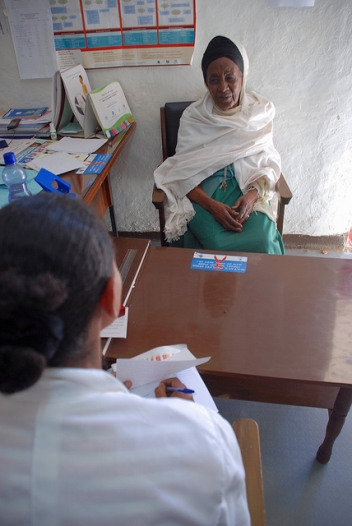 Thursday 1 December is World AIDS Day and this year the HIV community has much to celebrate.
Thursday 1 December is World AIDS Day and this year the HIV community has much to celebrate.
We have seen declines in new infections; new and ambitious commitments and targets for the HIV response set by world leaders at the UN High Level Meeting in June and a continued increase in the numbers of people accessing antiretroviral therapy (ART).
As a result, there has been a decline in the number of AIDS related deaths.
To keep updated on our progress sign up to our e-Newsletter
However this World AIDS Day, for HelpAge and for the older people living with and affected by HIV, we are contemplating a mixture of frustrations and opportunities.
For us, the bottom line is that still too little is being done to address the impact of HIV on older people, their complete absence in the 2011 Political Declaration from the High Level Meeting being a case in point.
The HIV epidemic is ageing
Yet we do have an opportunity. The epidemic is undoubtedly ageing and increasingly we do have some data available that proves this.
We now know that around 13% of people living with HIV in sub-Saharan Africa are in their 50s and above, and current estimates show by 2015 over 50% of people with the virus in the US will be in this age group.
The UNAIDS World AIDS Day Report 2011 and the new data on the reduction of AIDS related deaths, also provides a clear indication that prevalence among older people will continue to rise as more people are living longer with HIV.
So in the face of this evidence, what are we doing?
A conference to mark World AIDS Day
To mark World AIDS Day this year, HelpAge is holding a conference “HIV and ageing in Africa” on the 2 and 3 December in Ethiopia.
We are very excited to be hosting this event in partnership with UNAIDS, the WHO and the University of Sydney.
UNAIDS and WHO’s involvement in the conference is a clear indication that they recognise the importance of this issue and the need to respond.
We are looking forward to working with UNAIDS and WHO (and the University of Sydney, School of Public Health which is doing great research on HIV and ageing) both at the conference, and crucially afterwards, to jointly ensure HIV and ageing is better addressed in the HIV response in future.
At the conference we will be addressing the needs of both older people living with HIV and older carers. We will have a session presenting the data we have on prevalence among older people and an exciting presentation of new projections of prevalence among older people in the coming decades based on likely ART scale up rates.
We will be talking about how HIV affects older people’s health and will have a frank conversation about older people’s sexual behaviour.
We will also be looking at what is currently being done to address older people’s needs. We have some good examples of programmes and research at the community level that are focusing on a range of issues, from HIV education, to emotional support for grandparents caring for their grandchildren, and the benefits of pensions for older carers and their families.
And most importantly older people living with and affected by HIV will be at the conference themselves, sharing their experiences and telling us what HIV means to them and their families.
For HelpAge this conference provides a great opportunity to bring together colleagues from Governments, UN agencies, academia and civil society to share their knowledge and plan for the future. We hope that together, we can begin to develop a response that will meet the needs of older people living with HIV.
Our key issues:
1. To address the data challenge and ensure Governments and the UN system are collecting, analysing and reporting data on HIV for those aged 50 and above
2. To highlight the lack of understanding about the health implications of living in older age with HIV and the need for more research into this issue if we are to be able to support older people properly in the future
3. To recognise the contribution older people are making through the care they are providing to family and community members and to ensure they are better supported
4. To take full advantage of the opportunity the conference provides to develop a joint way forward so we can work with older people living with and affected by HIV to ensure their needs are met and they can finally come out of the shadows of the HIV response
What next?
- Download a free copy of Psychosocial Care and Support for Older Carers of Orphaned and Vulnerable Children: Policy Guidelines.
This publication looks at psychosocial support and how it relates to older carers in Africa. It offers recommendations to influence policies which provide support for older carers. It targets decision makers, health care workers and government agencies.
- HelpAge’s CEO Richard Blewitt will be talking about HIV and Ageing on The Health Show on BBC World this weekend (26 and 27 November). ‘HIV and ageing’ airs on BBC World on Saturday at 1010 and 2010 GMT and on Sunday at 0710 and 2310 GMT. Or the whole programme will be on www.rockhopper.tv from Saturday morning.
